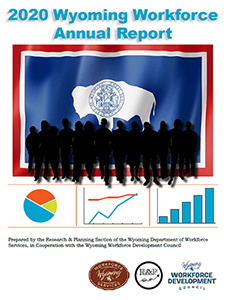Demographics and Earnings of Persons Working in Wyoming
by County, Industry, Age, & Gender, 2000-2019
Table of Contents | Introduction | Definitions | Articles | Home
Tables by Industry, County, Age, & Gender, 2000-2019 (Excel)
Published October 2020.
Definitions
Year. Calendar year; first quarter through fourth quarter.
County of Employment. The county in which an individual was employed. If an individual had wages in more than one county in a year, he was assigned to the county where he had the highest wages.
Industry of Employment. The industry in which an individual was employed. If an individual had wages in more than one industry in a year, she was assigned to the industry in which she had the highest wages.
Gender. Men or women, as identified by linking wage records with other administrative databases, such as the driver's license file obtained from the Wyoming Department of Transportation. Individuals for whom demographic data were not available are classified as nonresidents.
Age Group. An individual's oldest age in a given year. For example, a person born in December 1975 would be counted as age 44 in 2019. Individuals were then placed into the age groups presented in the tables (00-19, 20-24, 25-34, etc.).
Number (N). The number of individuals with wage records in a given county or industry at any time during the year. Each individual is only counted once.
Age Percent. The number in a given age group divided by the total. For example, of the 16,951 women with wage records in retail trade in 2019, 1,905 (11.2%) were under age 20. In other words, 1,905 divided by 16,951 = 11.2%.
Gender Percent. The total number of individuals of one gender divided by the total number of individuals with wage records in that industry or county. For example, in 2019, 76.3% of all persons with wage records in health care & social assistance were women, 18.5% were men, and 5.2% were nonresidents.
Average Annual Wage. The average (mean) wages earned in a calendar year by gender, age, county, or industry.
Average Quarters Worked. The average (mean) number of quarters worked during a given year by gender, age, county, or industry.
Average Annual Employers. The average (mean) number of employers in a year by gender, age, county, or industry.
Nonresidents (N/A). Individuals for whom demographic data are not available.


.svg)
 Wyoming at Work
Wyoming at Work